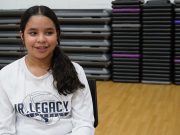Nearly a month after the start of the Israel-Gaza war, people from Miami’s Jewish and Muslim communities walked down their city’s streets slide-by-side.
Hosted by interfaith group Mosaic Miami on Nov. 5, the annual We Are United March encouraged people of every race, ethnicity, and political affiliation to march in solidarity from Freedom Tower to The Underline Park.
Mosaic executive director Matt Anderson helped plan the demonstration months before the Hamas attack against Israel on Oct. 7 triggered the current war, but knew it would take on greater significance after it.
“Our march was the first visible showing from people from the Christian, Jewish, and Muslim communities together,” said Anderson. “We might not have all agreed at that moment, but we were showing solidarity.”
As the Israel-Palestine conflict divides people and communities across the country, Mosaic Miami seeks to build bridges through coalition building and encouraging people to meet face-to-face.
Founded in 1935, the organization was first known as the Miami Coalition of Christians and Jews, and came together to champion equality and push back against the racism of groups like the Klu Klux Klan.
It has since been a constant presence in South Florida, standing with its communities through historic events like the Civil Rights Movement in the 1960’s, the McDuffie riots in the 1980’s, and 9/11.
In May, the group rebranded itself to Mosaic Miami, wanting to better represent the work they did with those outside of the Christian and Jewish communities.
“We came up with Mosaic Miami, which means bringing all pieces of Miami together to make something beautiful,” Anderson said.
Central to the group’s mission is embracing diversity and fighting for a more inclusive Miami, working towards that goal through its programs and year-round events.
Among these events are the “Can We Talk? Really, Can We Talk?” discussions, where audience members gather around panelists to exchange ideas on topics like race, diversity, and mental health.
Experts and thought leaders are typically brought in to lead these moderated discussions every few months, answering questions from guests who are given the floor.

Mosaic believes a “Can We Talk” would be an ideal space to address the Israel-Palestine war, but is grappling with how best to handle it.
The group has seen how strongly people in Miami feel about the conflict. Just six days after the “We Are United March,” protesters in support of both Palestine and Israel walked down Miami Beach on the same day, with police keeping both groups apart.
Israel-Palestine will likely remain a topic that drives demonstrations and debates, with Israeli Prime Minister Benjamin Netanyahu stating his intention of continuing the war until Hamas is eliminated.
Airstrikes resumed in the Gaza Strip Friday, and ending a weeks-long ceasefire dedicated to hostage exchanges.
Mosaic has been careful about releasing statements or hosting events dedicated to addressing the conflict, wanting to respect their historic ties to both Miami’s Jewish and Muslim communities.
Anderson said some of the statements the group has released on social media have received backlash because of their balanced and impartial approach.
But as tensions heighten in the Middle East, he knows the group can no longer ignore the elephant in the room.
“Temperatures are coming to a point where, I think, we can now have a place with people that are emotionally capable and willing to talk to people with different perspectives,” said Anderson.
The “Can We Talk” on Israel-Palestine is still in the planning stages, he said. The only certainty is that it will break from the traditional question-and-answer format.
Mosaic will host a small-scale event during the first quarter of 2024 with the goal of airing perspectives about the conflict in hopes of helping participants reach a mutual understanding.
Anderson said Mosaic may not get everything right the first time, but they are nonetheless committed to fostering thoughtful and impactful interactions.
He believes it is impossible for people to hate one another once they know each other’s stories, and that sentiment lies at the heart of everything Mosaic Miami does.
“We’re all grieving,” said Anderson. “But if we can come to the table with some sort of common ground, that will transmit down to the community and help us all progress.”

































